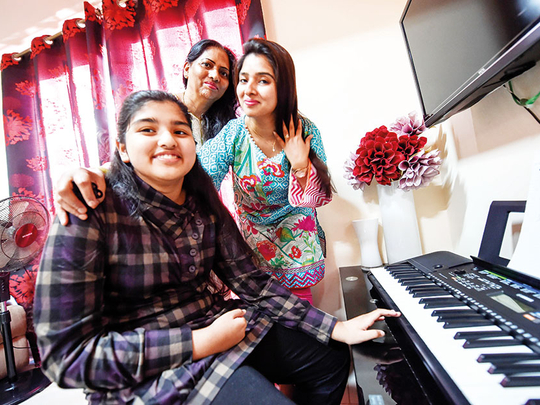
Dubai
Observing the fast during Ramadan is challenging for Sabina Anjum, a single working mother of 12-year-old Zaara Shafiq, diagnosed with Autism Spectrum Disorder. But she has learnt to cope with them.
“It is a matter of pride and determination for me to keep the Ramadan fast,” says Sharjah-based Anjum, who works for an IT firm.
Explaining her situation, Anjum said: “Zaara seemed absolutely fine when she was born in 2005 although she was slightly premature. All her milestones were normal. However, I noticed that whenever I asked her something about her playschool, she would repeat my question instead of answering it.”
It was clear to Anjum that she needed to seek professional help for her daughter. Subsequently, Zaara was diagnosed with Autism Spectrum Disorder and even as Anjum was coping with this development, her marriage was heading for a divorce.
Despite the pressures, Anjum’s focus on her daughter’s requirements did not waver. “I admitted Zaara to Oloom Centre (a Sharjah-based training centre that helps children with special needs academically) as I did not want her to face the pressures of a mainstream school. The centre has education, music and extra-curriculars” and Anjum believes these facilities are of help for her daughter.
During Ramadan, Zaara’s school timings change to 12.45 to 4.30pm and this necessitates making adjustments while keeping her own Ramadan schedule on track.
In her altered routine during Ramadan, Anjum and her mother, who has been living with her to offer support, wake up at 2.45am for the morning prayers and suhour.
“We have to be careful to not wake my daughter up and [so] literally tiptoe our way around [in the house].”
There is a reason for this caution. “In case Zaara wakes up, it becomes near impossible for me to go through my predawn routine as she simply cannot sleep without me by her side,” explains the mother.
Anjum said she has had to practise plenty of patience to respond to her daughter’s requirements even while making sure that she herself follows all the practices.
“My mother and I read the Quran, offer namaz (prayer) and try to bring about a spiritually calming ethos at home. I want my daughter to understand the importance of this and to a large extent, due to our persistence, she has realised that she needs to calm down.”
Sleep patterns
One of the challenges during this month is to cope with the change in sleep patterns, said Anjum. “Zaara usually gets up at 9.30am during Ramadan. I try and have a short nap after my suhour and morning prayers from 5am to 7am so that I can report to work fresh. However, due to my getting up earlier, if my daughter’s sleep is disturbed and she gets cranky, then it is near impossible for me to catch up on sleep.”
At work, Anjum usually has a hectic schedule and returns home by 6.30pm while her daughter returns at 5.30pm.
“At home, my mother has to handle many household chores, as we cook large portions of food for charity, so she does not sleep during the afternoon.
“When I arrive, I barely have enough time to wash, clean, end the fast and sit for evening prayers before we sit down to an iftar meal. This time is crucial as my daughter is trying to spend time with me. She gets very upset [if my attention is elsewhere].”
Islamic values
For Anjum, it is important that her daughter be taught the essence of Ramadan. “Sometimes, it is difficult to make her understand this and I have to be extremely calm,” she said.
“I want my daughter to listen to all the prayers, the stories from the Quran and learn lessons of charity, generosity, patience and piety,” she said.
“I am thankful to this month which gives me an opportunity to instil all spiritual and Islamic values in my daughter and I can see the changes in Zaara. Whenever we go shopping, she thinks of buying clothes for the underprivileged and always talks of giving away food and toys.”
Ramadan, she said, has taught her important lessons in patience, compassion, forbearance. “I have become a better person by taking up the challenge of imparting all these values to my daughter.”










